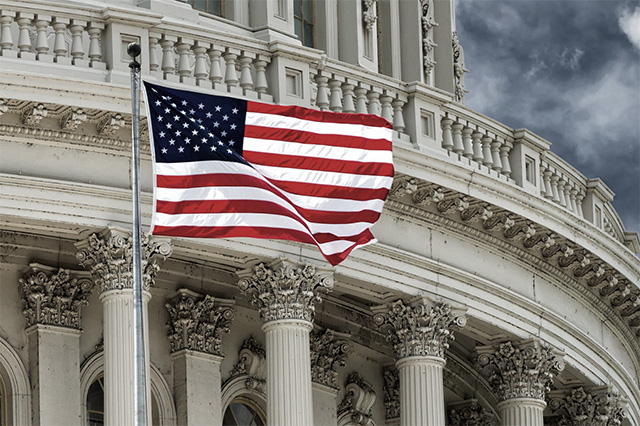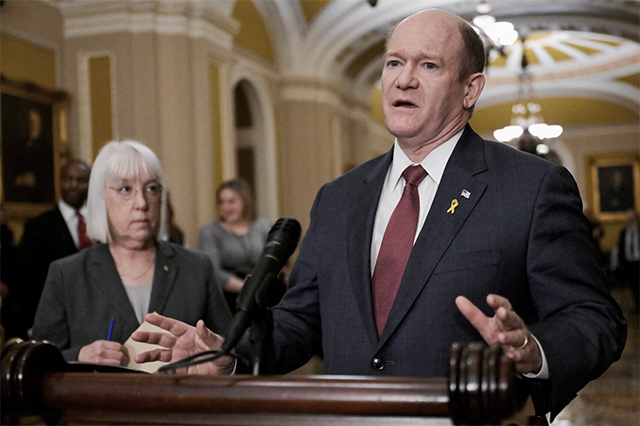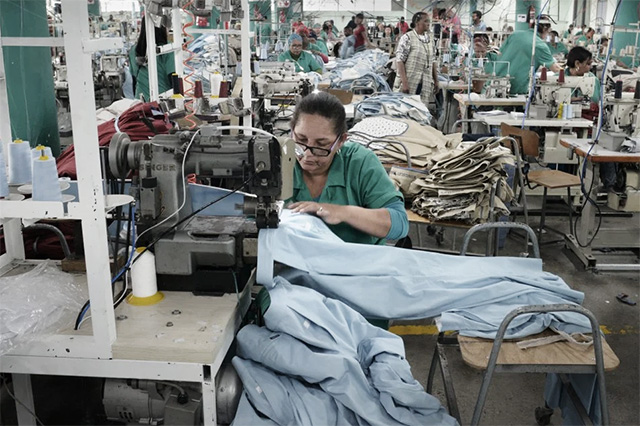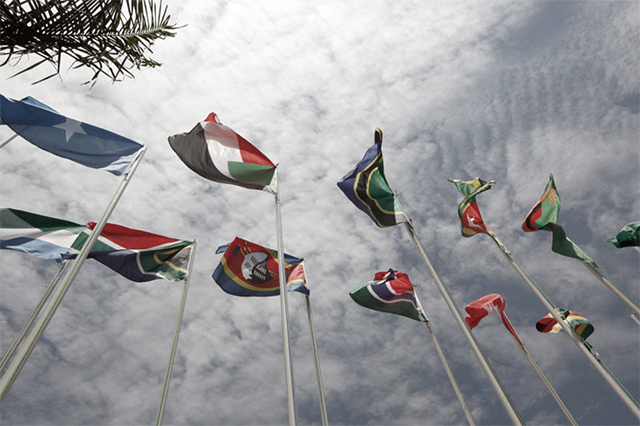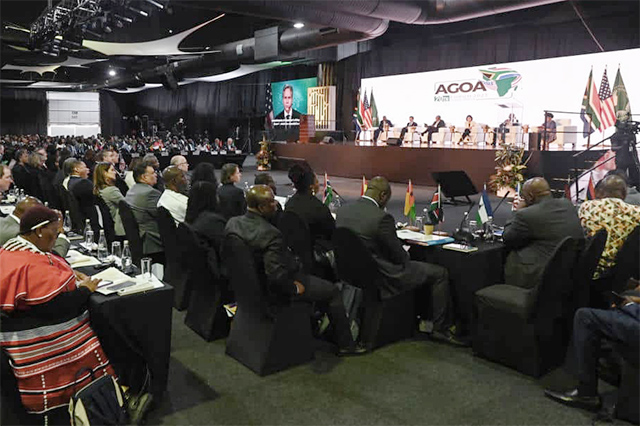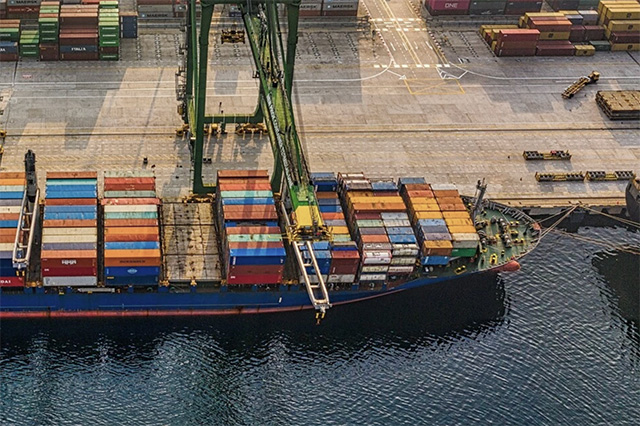** AGOA eligibility review 2023 (for year 2024): Timelines of hearings and request for comments ** [Deadline written submissions 7 July]
The Office of the United States Trade Representative (USTR) is announcing the initiation of the annual review of the eligibility of sub-Saharan African countries to receive the benefits of the African Growth and Opportunity Act (AGOA).
The AGOA Implementation Subcommittee of the Trade Policy Staff Committee (AGOA Subcommittee) is requesting written public comments for this review and will conduct a virtual public hearing on this matter.
In developing its recommendations for the President on AGOA country eligibility for calendar year 2024, the AGOA Subcommittee will consider the written comments, written testimony, and oral testimony.
DATES:
July 7, 2023 at 11:59 p.m. EDT: Deadline for submission of written comments, requests to testify, and written testimony, regarding the eligibility of countries to be designated as beneficiary sub-Saharan African countries.
July 24, 2023 at 10:00 a.m. EDT: The AGOA Subcommittee will convene a virtual public hearing to receive oral testimony related to sub-Saharan African countries' eligibility for AGOA benefits via WebEx.
ADDRESSES:
The AGOA Subcommittee strongly prefers electronic submissions made through the Federal eRulemaking Portal: https://www.regulations.gov ( Regulations.gov). Follow the instructions for submitting written comments and testimony and requests to testify in sections III and IV below, using Docket Number USTR–2023–0003. For alternatives to on-line submissions, please contact Jeremy Streatfeild, Director of African Affairs, Office of African Affairs, in advance of the relevant deadline at This email address is being protected from spambots. You need JavaScript enabled to view it. or (202) 395–8642.
FOR FURTHER INFORMATION CONTACT:
Jeremy Streatfeild, Director of African Affairs, Office of African Affairs, at This email address is being protected from spambots. You need JavaScript enabled to view it. or (202) 395–8642.
SUPPLEMENTARY INFORMATION:
I. Background
AGOA (Title I of the Trade and Development Act of 2000, Pub. L. 106–200) (19 U.S.C. 2466a et seq.), as amended, authorizes the President to designate sub-Saharan African countries as beneficiaries eligible for duty-free treatment for certain additional products not included for duty-free treatment under the Generalized System of Preferences (GSP) (title V of the Trade Act of 1974 (19 U.S.C. 2461 et seq.) (1974 Act), as well as for the preferential treatment for certain textile and apparel articles. The President may designate a country as a beneficiary sub-Saharan African country eligible for AGOA benefits if he determines that the country meets the eligibility criteria set forth in section 104 of AGOA (19 U.S.C. 3703) and section 502 of the 1974 Act (19 U.S.C. 2462).
Section 104 of AGOA includes requirements that the country has established or is making continual progress toward establishing, among other things:
- a market-based economy;
- the rule of law;
- political pluralism;
- the right to due process;
- the elimination of barriers to U.S. trade and investment;
- economic policies to reduce poverty;
- a system to combat corruption and bribery, and;
- protection of internationally recognized worker rights.
In addition, the country may not engage in activities that undermine U.S. national security or foreign policy interests or engage in gross violations of internationally recognized human rights. Section 502 of the 1974 Act provides for country eligibility criteria under GSP. For a complete list of the AGOA eligibility criteria and more information on the GSP criteria, see section 104 of the AGOA and section 502 of the 1974 Act.
Section 506A of the 1974 Act requires the President to monitor and annually review the progress of each sub-Saharan African country in meeting the foregoing eligibility criteria in order to determine if a beneficiary sub-Saharan African country should continue to be eligible, and if a sub-Saharan African country that currently is not a beneficiary, should be designated as a beneficiary. If the President determines that a beneficiary sub-Saharan African country is not making continual progress in meeting the eligibility requirements, the President must terminate the designation of the country as a beneficiary sub-Saharan African country. The President also may withdraw, suspend or limit the application of duty-free treatment with respect to specific articles from a country if he determines that it would be more effective in promoting compliance with AGOA eligibility requirements than terminating the designation of the country as a beneficiary sub-Saharan African country.
For 2023 the President designated the following 35 countries as beneficiary sub-Saharan African countries:
1. Angola
2. Benin
3. Botswana
4. Cabo Verde
5. Central African Republic
6. Chad
7. Comoros
8. Democratic Republic of Congo
9. Republic of Congo
10. Cote d'Ivoire
11. Djibouti
12. Eswatini
13. Gabon
14. The Gambia
15. Ghana
16. Guinea-Bissau
17. Kenya
18. Lesotho
19. Liberia
20. Madagascar
21. Malawi
22. Mauritius
23. Mozambique
24. Namibia
25. Niger
26. Nigeria
27. Rwanda (AGOA apparel benefits suspended effective July 31, 2018)
28. Sao Tome & Principe
29. Senegal
30. Sierra Leone
31. South Africa
32. Tanzania
33. Togo
34. Uganda
35. Zambia
The President did not designate the following sub-Saharan African countries as beneficiary sub-Saharan African countries for 2023:
1. Burkina Faso
2. Burundi
3. Cameroon
4. Equatorial Guinea (graduated from GSP; ineligible for consideration for AGOA benefits)
5. Eritrea
6. Ethiopia
7. Guinea
8. Mali
9. Mauritania
10. Seychelles (graduated from GSP; ineligible for consideration for AGOA benefits)
11. Somalia (requested consideration for AGOA benefits for the first time this year)
12. South Sudan
13. Sudan (did not request designation as an AGOA beneficiary country)
14. Zimbabwe
The AGOA Subcommittee is requesting written public comments for this review and will conduct a virtual public hearing to develop recommendations to the President in connection with the annual review of sub-Saharan African countries' eligibility for AGOA benefits. The Secretary of Labor may consider comments related to the child labor criteria to prepare the U.S. Department of Labor's report on child labor as required under section 504 of the 1974 Act.
II. Hearing Participation
The AGOA Subcommittee will convene a virtual public hearing to receive oral testimony related to sub-Saharan African countries' eligibility for AGOA benefits via WebEx on Monday, July 24, 2023, beginning at 10:00 a.m. EDT. Persons wishing to observe the public hearing will find a link on USTR's web page for sub-Saharan Africa on the day of the hearing at https://ustr.gov/countries-regions/africa.
To ensure participation, you must submit requests to present oral testimony at the hearing and written testimony by midnight on July 7, 2023, via Regulations.gov, using Docket Number USTR–2023–0003. Instructions for submission are in sections III and IV below. Remarks at the hearing will be limited to no more than five minutes to allow for possible questions from the AGOA Subcommittee. Because the hearing will be public, testimony should not include any business confidential information (BCI). USTR will provide a link in advance of the virtual hearing to persons wishing to testify.
The AGOA Subcommittee requests small businesses (generally defined by the Small Business Administration as firms with fewer than 500 employees) or organizations representing small business members that submit comments to self-identify as such, so that we may be aware of issues of particular interest to small businesses.
III. Procedures for Written Submissions
To be assured of consideration, submit your written comments, requests to testify, and written testimony by the July 7, 2023, 11:59 p.m. EDT deadline. All submission must be in English. The AGOA Subcommittee strongly encourages submissions via Regulations.gov, using Docket Number USTR–2023–0003.
To make a submission via Regulations.gov, enter Docket Number USTR–2023–0003 in the `search for' field on the home page and click `search.' The site will provide a search results page listing all documents associated with this docket. Find a reference to this notice by selecting `notice' under `document type' in the `refine documents results' section on the left side of the screen and click on the link entitled `comment.'
Regulations.gov allows users to make submissions by filling in a `type comment' field or by attaching a document using the `upload file' field. The AGOA Subcommittee prefers that you provide submissions in an attached document and note `see attached' in the `comment' field on the online submission form. The AGOA Subcommittee prefers submissions in Microsoft Word (.doc) or Adobe Acrobat (.pdf). If you use an application other than those two, please indicate the name of the application in the `type comment' field.
At the beginning of your submission or on the first page (if an attachment), include the following text: (1) 2024 AGOA Eligibility Review; (2) the relevant country or countries; and (3) whether the submission is a comment, request to testify, or written testimony. Submissions should not exceed 30 single-spaced, standard letter-size pages in 12-point type, including attachments. Please do not attach separate cover letters to electronic submissions; rather, include any information that might appear in a cover letter in the submission itself. Similarly, to the extent possible, please include any exhibits, annexes, or other attachments in the same file as the submission itself, not as separate files. You will receive a tracking number upon completion of the submission procedure at Regulations.gov. The tracking number is confirmation that Regulations.gov received your submission. Keep the confirmation for your records. USTR is not able to provide technical assistance for Regulations.gov.
For further information on using Regulations.gov, please consult the resources provided on the website by clicking on `How to Use Regulations.gov ' on the bottom of the home page. The AGOA Subcommittee may not consider submissions that you do not make in accordance with these instructions.
If you are unable to provide submissions as requested, please contact Jeremy Streatfeild, Director of African Affairs, Office of African Affairs, in advance of the deadline at This email address is being protected from spambots. You need JavaScript enabled to view it. or (202) 395–8642, to arrange for an alternative method of transmission. USTR will not accept hand-delivered submissions. General information concerning USTR is available at www.ustr.gov.
IV. Business Confidential Information (BCI) Submissions
If you ask the AGOA Subcommittee to treat information you submit as BCI, you must certify that the information is business confidential and you would not customarily release it to the public. For any comments submitted electronically containing BCI, the file name of the business confidential version should begin with the characters `BCI.' You must clearly mark any page containing BCI with `BUSINESS CONFIDENTIAL' at the top of that page. Filers of submissions containing BCI also must submit a public version of their submission that will be placed in the docket for public inspection. The file name of the public version should begin with the character `P.'
V. Public Viewing of Review Submissions
USTR will post written submissions in the docket for public inspection, except properly designated BCI. You can view submissions at Regulations.gov by entering Docket Number USTR–2023–0003 in the search field on the home page.
William Shpiece,
Chair of the Trade Policy Staff Committee, Office of the United States Trade Representative.


![** AGOA eligibility review 2023 (for year 2024): Timelines of hearings and request for comments ** [Deadline written submissions 7 July] ** AGOA eligibility review 2023 (for year 2024): Timelines of hearings and request for comments ** [Deadline written submissions 7 July]](https://agoa.info/images/articles/16212/_thumb2/ustrlogo.jpg)
